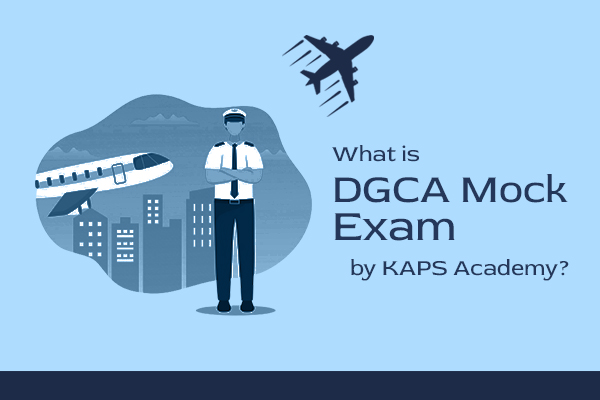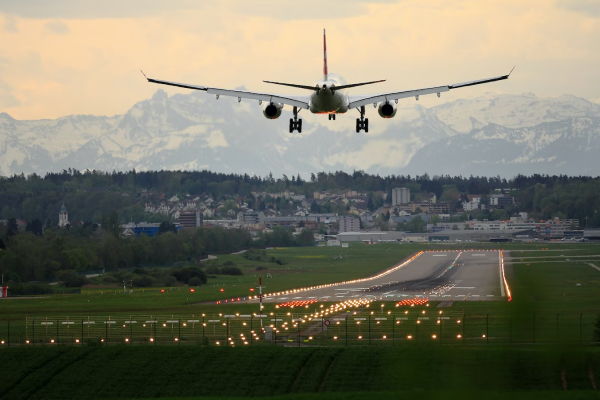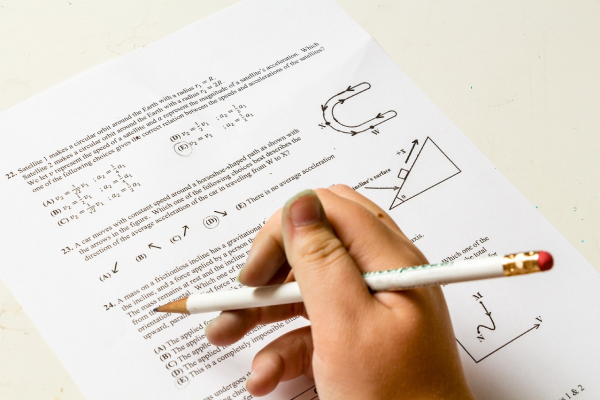Blogs

Path to Become a Commercial Pilot: Steps and Requirem...
14 December,2023
Flying an aircraft is a dream come true to many, and one of the ways you can make this dream come true is by becoming a commercial pilot. Becoming a pilot helps you pursue an exciting and adventurous career, which is also one of the best-paid jobs in the aviation industry. A commercial pilot requires technical expertise, strong ethics, and a commitment to safety. But the journey to become a Commercial Pilot is not without its challenges.
Learn more about the requirements and steps required to become a successful commercial pilot.
What is required?
The prerequisites to get the aviation certification vary from country to country. In India, the Directorate General of Civil Aviation (DGCA) has laid out the requirements to become a commercial pilot. They are:
Age
The minimum age requirement for the individual to apply for the Commercial Pilot License (CPL) certification is 18 years, but they can commence their training by the time they are 17.
Educational Qualification
The applicant should have passed their 10+2 with Physics and Mathematics as the core subjects and with a minimum score of 50% in these subjects. Though these are the basic requirements, some institutions may have different requirements and preferences.
Medical Qualification
Before starting your aviation career, you must be proven physically fit. They must meet all the medical fitness criteria mandated by the DGCA. The candidates must clear the medical examination conducted by DGCA-approved authorised examiners to determine their health and prove their fitness to enter this field.
English Language Proficiency
English is the language of communication used far and wide in the aviation industry. All candidates who wish to become pilots must be proficient and fluent in English. The DGCA also conducts an English Language Proficiency (ELP) Test to test the calibre of the candidates and ensure that they are fit for this position. The ELP test includes three sections - Reading, Listening and Speaking.
How to Get Your CPL
The Commercial Pilot License is a certification issued by the DGCA, and this license will allow the candidate to act as the ‘Pilot in Command’ or as a ‘Co-pilot’ of single and multi-engine aeroplanes. Any candidate aspiring to become a commercial aircraft pilot must follow the following steps to get their pilot license.
Fulfill the Eligibility Criteria
The first step towards getting your CPL license is to fulfil everything as mandated by the DGCA. To get into flight school and get your license, you must be of the minimum age, have fulfilled the educational requirements, must be physically and mentally fit, and must have a good command of the English language.
Research about various Flight School
Once you have fulfilled all the requirements, the next step is to research and find out about the best aviation schools in the country. While choosing an aviation school, pick the one that fulfils your needs and requirements like the training procedure, the location, or the fee structure, like KAPS Academy. With limited students in each batch, our training program focuses on ensuring personal attention to each candidate, and classes are held by instructors with decades of experience in the aviation industry.
Get your Medical Certificate
Another essential step in your journey to becoming a successful pilot is to prove that you are medically fit. You must get all the required tests done by a DGCA-approved medical examiner and submit your Cass 2 and Class 1 medical certificates.
Class 1 certificate is a medical document for pilots engaged in commercial air operations. The medical standards for this certification are high. The Class 1 medical certificate requirements include eyesight, ears, psychical examination, electrocardiogram (ECG), lung function, cholesterol blood, haemoglobin blood, chest X-ray, urine, and period of validity.
This certification is valid for one year, after which the candidate must reapply for this certificate to continue their flight training and operations. To know more about medical requirements, read our blog here.
Get your other Certifications and Licenses
Before you get your CPL License, you must ensure that you have The Private Pilot License (PPL) and Multi-Engine Piston Rating (MEP). Only after acquiring these licenses and certifications will the candidate become eligible to apply for the Commercial Pilot certification.
Start with your Ground School Training
To get your certification, the candidate must apply for the aviation school and start training to gain all the required knowledge about the aviation industry. These schools or training centres cover the theoretical aspects of flight training and conduct examinations to check their calibre. The aspects of the ground school training include:
- Air Regulations - The Ground School covers the study of aviation regulations and procedures, including airspace rules, flight operations and safety protocols.
- Aerodynamics and Aircraft Systems - Ground School training delves into the principles of aerodynamics, including the operation of the aircraft, and also about various aircraft systems like aircraft engines, electrical systems and navigation instruments.
- Meteorology - As you know, weather and climate play an important role in aviation. The Ground school training also covers meteorology lessons, and the students will learn to interpret the weather charts, understand the weather patterns, and make flight plans regarding the meteorological conditions.
- Navigation and Flight Planning - Ground School Training also helps the candidates equip their skills in planning flights, calculating fuel requirements, and navigating using charts, instruments and other electronic aids.
Finish the required Flight Time
Apart from the theoretical knowledge, an individual applying for the CPL certification must have completed a certain amount of flying hours to apply for the license. They should have completed a minimum of 200 total flight hours, 100 hours as pilot-in-command, and 20 hours of cross-country flight time as pilot-in-command for about 540 km (300NM).
Complete the CPL Flight Test
Only after attending the Ground Training Classes and completing the required flight time can the candidates demonstrate their competency by sticking to the rules and regulations of the DGCA and their flight skills.

What is DGCA Mock Exam by KAPS Academy?
Mr Sanjeet Dube 24 August,2023
What is DGCA Mock Exam by KAPS Academy? The DGCA Mock Exam by KAPS Academy is a comprehensive and highly reputed preparatory program designed to help aspiring aviation professionals excel in their Directorate General of Civil Aviation (DGCA) exams. KAPS Academy, a leading aviation training institute, has collaborated with industry experts and seasoned pilots to create a cutting-edge mock exam. At KAPS Academy, we conduct DGCA Mock Exam for all the candidates, and the candidate is given a representation of DGCA papers which they will have to clear within a stipulated time.
How Does This Mock Exam Help You?
Assess your knowledge
Taking a mock exam from KAPS Academy will give you access to multiple papers, which help you get familiarised with the patterns, and you will be better prepared as you know the type of questions that are constantly asked.
Learning to manage your time
By solving a number of question papers you will be able to prepare for your exam. The time allotted for the mock exam is two hours and the questions to be answered are 50. Solving multiple papers will help you improve your speed in solving, which in turn can help you manage your time accordingly.
Identifying the knowledge gaps
By solving multiple mock exam papers, you will be familiarised with the types of questions usually asked in the exam. This will help you understand which are the topics that are holding you back and work on them accordingly. By solving mock exam papers, you will get to know which are the gaps that have to be filled so that you can pass the exam with flying colours.
Build up self-confidence
Each time you solve a problem and get it right, there is a sense of achievement that you feel, and this will eventually build up your confidence. This way, by solving multiple mock exam papers you will be able to crack your exams and get one step closer to achieving your dream.
Reduce exam stress
By solving multiple mock exam papers, you are now familiarised with the pattern of the question papers, the types of questions frequently asked, and the time you can take to solve each of the questions. These will indeed help you reduce your stress during the time of your exam.
Comprehensive Feedback
The candidates will get comprehensive feedback from their teachers based on their performance. With this, the students will be able to analyse their performance and know where they stand.
So, invest your time and effort in DGCA mock exams to maximise your chances of success and pave the way for a fulfilling career in aviation.
About KAPS Academy
KAPS Academy was started with a vision to satisfy every student’s dream of becoming a professional pilot. It is the first aviation institute in Bangalore established to provide the best training and guidance for students who want to become pilots. Each and every faculty here at KAPS Academy has had a practical experience of 36 years working for some of the leading airlines in India. So, with this broad knowledge and experience, we decided to provide a platform for all the upcoming pilots so that they can fulfil their dream of becoming professional pilots.
Through our pilot training program, we ensure that the students are thorough with all the theoretical aspects of flying. Our mission is to help all candidates clear their pilot exams successfully.

Guide To ATPL License
Mr Sanjeet Dube 22 February,2023
Airline Transport Pilot’s Licence is the next License one has to obtain after obtaining CPL. ATPL is a must for a pilot to be in Command of any aircraft weighing more than 5700 kgs. As such to fly in command for any commercial airlines one has to get ATPL.
The requirement for obtaining ATPL are as follows-
1 Age- Minimum 21 year on the date of application
2 Knowledge- One has to pass written and oral exam in Navigation & Radio Aids. Both these papers are having 90 questions and one has to obtain 63 marks. After one gets minimum of 63 then one has to appear for a viva and obtain a minimum of 7 out of 10 to pass the subject. Viva is conducted by a team comprising of a Designated Examiner’s along with personnel from DGCA. In this viva one is checked for their practical knowledge along with their confidence in tackling the questions.3 attempts are given to individual’s after clearing the written exam. Viva’s are held after written exam results are published. Viva are held in Delhi/ Mumbai/ Kolkata/ Chennai. If an individual is unable to clear the viva in three attempts, then one has to reappear in the written exam. Viva’s are held separately for Navigation & Radio Aids. Metrology subject also has to be cleared, but this subject is not having any viva. In Meteorology one has to obtain 70/100.
3 Experience- Total of 1500 flying hours of which 150 hours should have been done in the preceding 12 months. Details of requirements is given in www.dgca.gov.in in the CAR Section 7, Series B.
The validity of the written papers are 5 years. Hence one should try to clear their ATPL papers ASAP after obtaining CPL. 5 years is a good enough time to get 1500 hours and other requirements. The written exam of ATPL is just an extension of the CPL subjects. Hence it is easier to clear the papers if one tries for the same soon after obtaining their CPL. In many cases individual struggle to clear ATPL after getting into any commercial flying since the mind now gets oriented more towards the practical aspects of flying & also trying to get more knowledge of the aircraft one has started to fly.

Medical Requirements for Taking CPL Exam
Mr Sanjeet Dube 24 January,2023
The requirement to obtain CPL are as follows-
1 AGE- Not less than 18 years of age on the date of application
2 QUALIFICATION- Passed Class 12 or equivalent exam with Physics & Maths from a recognized Board/ University.
Details are available in Civil Aviation Regulations section 7 under Requirements & Guidance at www.dgca.gov.in.
3 MEDICAL STANDARD- Candidate has to undergo Class 2 Medical.
This Medical can be carried out by an approved Doctor, a list of which is available at www.dgca.gov.in under Personnel- Medical. Prior to undergoing Class 2 Medical one must register at www.egca.com. On successful completion of Class 2 Medical, the candidate will be issued with CA-35, which is a temporary fitness certificate valid for 2 years.
The doctor sends all necessary documents to DGCA, and then a Medical assessment is issued by the Director of Medical Services, Civil Aviation, New Delhi (DMS CA). This can be downloaded from an individual’s DGCA account. SMS to this effect is also received by the individual. It is highly recommended that the candidate should undergo Class 1 initial Medical at any of the designated centres, on receipt of the Medical Assessment. This will ensure that you are “ Medically Fit” to obtain CPL.
The designated Medical Centres for Class 1 initial medical are as follows-
1 IAM, Bengaluru
2 Command Hospital, Bengaluru
3 AFCME, New Delhi
4 MEC, Jorhat
5 Air Force Hospital, Hindon
6 Air Force Hospital, Kanpur
7 Nanavati Hospital, Mumbai
8 Apollo Heart Centre, Chennai.
For SL 7& 8, one can contact the centres directly for an appointment. For IAF, Centres appointments are to be taken through DGCA. Details are given in www.dgca.gov.in
It is recommended that for Initial Class 1 Medical one should request 2-3 centres with different dates. This will ensure getting a confirmed appointment within the Validity.

Computer Number Details
Mr Sanjeet Dube 14 February,2023
CPL/ATPL exams conducted by DGCA are held four times in a year - March, June, Sept & December. The exams are conducted across 15 cities across India. The cities are as follows-
1 BENGALURU
2 BHOPAL
3 BHUBNESHWAR
4 KOLKATA
5 MUMBAI
6 GUWAHATI
7 HYDERBAD
8 LUCKNOW
9 CHENNAI
10 NEW DELHI
11 PATNA
12 PUNE
13 KOCHI
14 AHMEDABAD
15 CHANDIGARH
Fees for each paper is Rs2500. “On Demand Exams” are also being conducted by DGCA for the rest of the 8 months. Fees for these exams are Rs. 5000. It may please be noted that if a candidate fails in any paper, then that particular paper can only be attempted after a gap of 42 days. The “On Demand Exam” are conducted in only 5 cities-
1 New Delhi
2 Chennai
3 Mumbai
4 Kolkata
5 Bengaluru
To start the process of obtaining a CPL, one should apply for a Computer number. This number is issued by “Central Examination Office, RK PURAM, New Delhi
“Computer number” is a unique number given to an individual and used for all DGCA exams. The process of getting the Computer Number is given in detail at www.pariksha.dgca.in. The checklist is below-
Document Size Table
| SL.NO | Documents | TYPE | Maximum Size |
|---|---|---|---|
| 1. | Applicant Photograph | JPEG/JPG | 70KB |
| 2. | Applicant Signature | JPEG/JPG | 20KB |
| 3. | Xth Pass Certificate Date of Birth certificate | 100KB | |
| 4. | Xth Mark Sheet | 200KB | |
| 5. | Board Verificaion Certificate for Xth qualification | 100KB | |
| 6. | XIIth / Equivalent Mark Sheet | 200KB | |
| 7. | XIIth / Equivalent Pass Certificates | ||
| 8. | Board Verification Certificate for XIIth / Equivalent qualification | 100KB | |
| 9. | 10+2 Equivalent certificate from concerned Board/Institution/Directorate | 100KB | |
| 10. | Copy of proof of Permanent Address | 100KB | |
| 11. | Association of Indian University Certificate | 100KB | |
| 12. | UID Aadhaar Card | 100KB | |
| 13. | Passport | 200KB | |
| 14. | Security Clearance Certificate, if applicable | 100KB | |
| 15. | Experience Certificate, if applicable | 100KB | |
| 16. | PILOT License, if applicable | 200KB | |
| 17. | FATA Authorization Certificate | 100KB | |
| 18. | Visa, if applicable | 200KB | |
| 19. | Any other certificate | 100KB |
After duly following the instructions as laid down in pariksha.dgca.gov.in one gets an e-mail stating that documents have been received. Approximately after 45 days, the candidate will be informed through mail/SMS about the computer number. In case of rejection, reasons will be given. But the catch is that all the documents/ process has to be repeated even for one minor mistake. This will make the candidate wait again for approx. 2 months. As such one must be very careful &/ precise in applying for a “Computer Number”.

Guide to CPL License
Mr Sanjeet Dube 14 February,2023
The first exams one has to encounter in their journey to becoming a commercial pilot is CPL. CPL exams are conducted by DGCA. The schedule and centre of the exams are mentioned in my BLOG regarding Computer number. The papers which one has to appear for are as follows-
1. Air Navigation
2. Aviation Meteorology
3. Air Regulations
4. Aircraft & engines
5. Technical Specific
Of all these 5 papers, generally the candidates find Air Navigation the toughest to crack. So ideally, in the pursuance of becoming a CPL holder, one should start their preparation with Air Navigation. If towards the end of their preparation of Air Navigation the candidate finds that they have enough time before the exams, then one can attempt Air Law along with Air Navigation. Details of the syllabus is given in www.dgca.gov.in. One should click Regulations & Guidance and under that section one should go Civil Aviation Regulations, Section 4.
Air Navigation has 100 multiple choice questions, with 2 incorrect answers given along with one correct answer. This paper has the lengthiest syllabus among all pilot papers including that of ATPL. As such the candidate should start with this paper in order to remove the biggest obstacle from their path. This paper covers all topics of Navigation, Radio Aids & Instruments. These three topics form two separate papers, Air Navigation & Radio Aids in ATPL exams. Approximate three months’ preparation is required for these exams. One should give maximum mock exams (as presented by DGCA) so as to be at ease during DGCA conducted exams. The duration of this exam is 3 hours.
Aviation meteorology deals with the various aspects of weather elements which affect Aircraft operations. In this exam, DGCA gives 50 multiple choice questions. The duration of this exam is 2 hours.
Air Regulations deals with the various international bodies & laws of the world/ India through which civil aviation is governed. 50 multiple choice questions are asked in this exam. The duration of this exam is 2 hours.
Aircraft & Engine paper is also called Technical General. This paper deals with the General Aircraft structure, General Aircraft Systems & Aerodynamics. In the degree of difficulty, this paper can be given the second ranking behind Air Navigation. As such one should attempt this paper along with Meteorology after clearing Air Navigation. 100 questions have to be attempted in a time frame of 3 hours.
One should give themselves 6 to 9 months of time for clearing all these 4 papers. Previously one could see All India results and calculate the pass percentage. But for the last few years DGCA gives individual results, therefore as such it is difficult to calculate the percentage of successful candidates. But generally, the results are quite poor, specially for Air Navigation.
Technical Specific deals with the aircraft on which the candidate is taking flying training. As such one gives this exam, during flying training since when one is starting their journey, the type of aircraft is not known.
If the candidate decides to do flying training abroad, then Technical specific and General technical need not be given. If the candidate decides to give the paper after completing their flying training abroad then one has to give Composite paper in which Air Navigation & Meteorology questions are combined. In this paper about 20-25% questions are from Meteorology. Air Regulation paper as applicable to Indian students also has to be cleared.
In all DGCA exams, pass marks are 70%. Since there are no negative markings, the candidate should also learn to make intelligent guesses for the questions whose answer one is not sure of. All questions come with 3 choices and one has to spend minimum of 15 seconds on each question. As such it will be very beneficial for the students to undertake some mock online exams in the same format as of DGCA.
To clear DGCA exams it is advised to make the fundamentals strong. Previously one could get same questions with the same digits from the various books available in the market. But of late this practice has been stopped. Most of the questions are original questions and not extracted from the books. So it is better to chase the topics rather than the question papers. Once the syllabus is completed then the candidates should practice maximum number of mock tests.